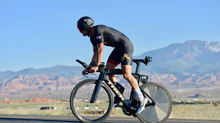

Road Shoes or Triathlon Shoes?
For IRONMAN or IRONMAN 70.3 racing, you have two types of shoes to choose from: road shoes or triathlon-specific cycling shoes. There are...


Marathon in the Offseason?
Marathons are hard but fun, I have said it a couple of times and will continue to do so. However, the reason for this blog is not to...


5 Bike Fit Tips
A professional bike fit is an absolutely worthy and necessary investment for triathletes of all ability. If you commit to training for an...


Yes, You Need a Power Meter
If you’re reading this article there’s a good chance you’re a triathlete. If that’s the case, it’s highly probable that you’ve heard of the terms power meter and wattage. What is a power meter? It’s an unnecessary, intimidating, expensive piece of equipment that produces complex data that can only be analyzed by a rocket scientist or an expensive coach using unusual computer software. Not exactly… What is power? Power is defined as the rate at which energy is transferred. E


Raceday Mechanicals
Dealing with bike issues and mechanicals is a part of racing. If you race long enough, it’s inevitable. You’ve spent thousands of hours...


































































































